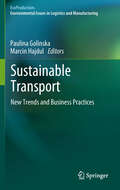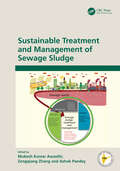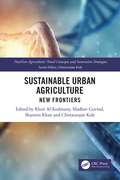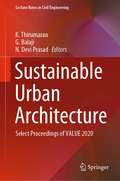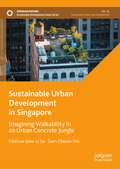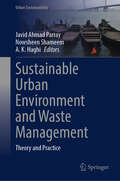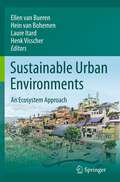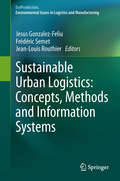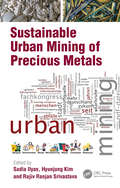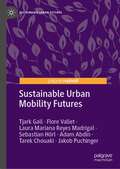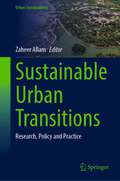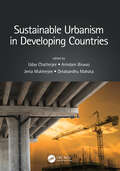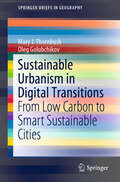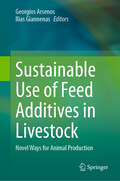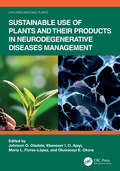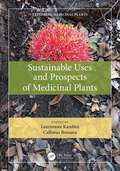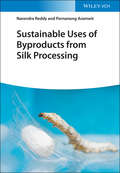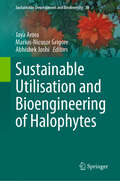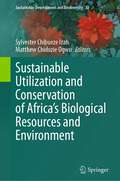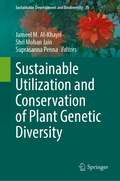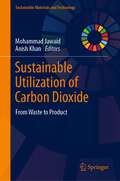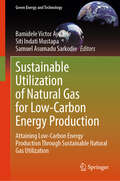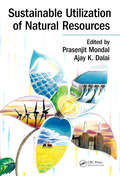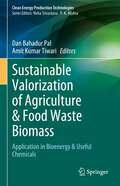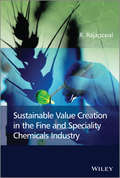- Table View
- List View
Sustainable Transport: New Trends and Business Practices
by Paulina Golinska Marcin HajdulThe aim of the book is to present the emerging environmental issues in organization and management of transport logistics. The scope of the book includes set of solutions which show different stakeholders' viewpoints on sustainability. It points out how the transport operations organized and conducted in companies and regions might be consistent with the concept of sustainable development. The scope of the book takes into consideration trade-off relations between actors directly and indirectly involved in transport networks. Therefore, the authors present, in individual chapters, innovative approach to eco-friendly organization and coordination of transport processes, as well as management of transport networks.
Sustainable Treatment and Management of Sewage Sludge
by Ashok Pandey Zengqiang Zhang Mukesh Kumar AwasthiThis reference book provides updated information about the technological advancement in sustainable thermochemical bioprocessing of sewage sludge disposal and resource recovery. It discusses the innovative strategies of resource recovery for the formulation of feedstock, clean compost production and safe application. This book traces the main chemical and biological properties of sewage sludge and covers biostabilization, detoxification, the role of microorganisms in sewage sludge management and the sustainable use of sewage sludge from a circular economy perspective. Key Features • Discusses organic waste disposal and recycling • Covers knowledge transfer from waste bioprocessing to commercially important end products • Includes industrial application of biological and thermochemical sewage sludge treatment toward emerging nutrient recovery technologies • Reviews the function and applications of microorganisms in sewage sludge treatment • Describes the application of sewage sludge as fertilizers in agriculture This book is meant for researchers and industry experts in environmental sciences, biochemical engineering and biotechnology.
Sustainable Urban Agriculture: New Frontiers (Nextgen Agriculture)
by Chittaranjan Kole Kheir Al-Kodmany Sharmin Khan Madhav GovindIn the vibrant discourse of urbanization and climate change, Sustainable Urban Agriculture: New Frontiers investigates emerging needs, rising challenges, and opportunities to support urban agriculture. Navigating the dynamic interplay of urbanization and environmental challenges, the book introduces two pivotal agendas for urban sustainability—the "green" agenda, focusing on environmental health, and the "brown" agenda, emphasizing human well-being and social justice. The book embraces a global perspective by confronting geographical biases and advocating for context-specific understanding and early interventions in small and medium cities. This transformative journey guides readers through uncharted territories, fostering profound awareness of urban agriculture's role in shaping a sustainable and resilient future in agriculture.Features Presents information on socio-ecological resilience, shaping a sustainable urban future Unveils practical implications, traversing frontiers where urban cultivation extends beyond crops, cultivating a thriving urban ecosystem Discusses diverse urban agriculture practices, from traditional methods to cutting-edge technologies Providing readers with an understanding of the multifaceted layers inherent in urban agriculture, this volume in the NextGen Agriculture: Novel Concepts and Innovative Strategies series is essential for academics, students, practitioners, and experts in urban agriculture and planning, horticulture, landscape architecture, and plant sciences.
Sustainable Urban Architecture: Select Proceedings of VALUE 2020 (Lecture Notes in Civil Engineering #114)
by K. Thirumaran G. Balaji N. Devi PrasadThis book presents select proceedings of the International Conference on Visionary Action towards Liveable Urban Environments (VALUE 2020). Various topics covered in this book include context responsive architecture, green architecture, energy efficient buildings, energy conservation, inclusive spatial environments, security in buildings and cities, green/smart/ intelligent architecture, sustainable mobility and smart communities. This book will be a valuable reference for students, researchers, and professionals interested in built environment and allied fields.
Sustainable Urban Development in Singapore: Imagining Walkability in an Urban Concrete Jungle (Sustainable Development Goals Series)
by Melissa Liow Li Sa Sam Choon-YinThis book offers theoretical and practical insights into land use, transport, and national policies in one of world’s well-known urban concrete jungle, none other than the Singapore city. The emphasis is situated on Singapore’s attempt to promote walking and cycling. Greater appreciation of walkability thrives on Singapore’s rich history, green city, people and the gastronomic kopitiam and hawker culture. The book offers a comprehensive coverage of walkability as a crucial component of urban design to reduce vehicular congestion with the associated carbon emissions, foster a healthy lifestyle and community participation and create jobs to help the economy. A high income per capita and an aging society, lessons drawn from Singapore’s experience will be useful to other societies. Scholars in sustainable tourism field, urban planners, government bodies, tourist boards, entrepreneurs, national parks board, residents, and inbound travellers will benefit from reading the book.
Sustainable Urban Environment and Waste Management: Theory and Practice (Urban Sustainability)
by Javid Ahmad Parray A. K. Haghi Nowsheen ShameemThis very unique research-oriented edited collection introduces waste and pollution treatment methods that can be adopted at local and international levels and examines appropriate resource management strategies for environmentally related issues. It aims to highlight the important role of education for environmental sustainability, in particular the area of urban waste management. Presenting the latest research topics innovative ideas to educate future citizens regarding sustainable development of our planet, it is of interest to readers who are involved in education, policy, science, and technological innovation for urban waste management. Education and awareness in the field of waste management is significantly important from a global perspective of resource management. The aim of this edited collection is creating an interdisciplinary platform for researchers and practitioners to present and discuss the most recent innovations, trends, and concerns as well as practical challenges encountered and solutions adopted in the fields of Environmental Science. This new book explores the crucial nexus between innovative solutions for waste management, and environmental sustainability in an edited collection. This comprehensive book provides a holistic investigation of the most recent inventions, advancements, and breakthroughs in waste management as the need for solutions to the environmental pollution problem becomes more urgent on a global scale. The book investigates the diverse environmental effect of environmental pollution and emphasizes how urgent it is to resolve the ecological costs of waste contamination.
Sustainable Urban Environments
by Henk Visscher Ellen M. van Bueren Laure Itard Hein Van BohemenThe urban environment - buildings, cities and infrastructure - represents one of the most important contributors to climate change, while at the same time holding the key to a more sustainable way of living. The transformation from traditional to sustainable systems requires interdisciplinary knowledge of the re-design, construction, operation and maintenance of the built environment. Sustainable Urban Environments: An Ecosystem Approach presents fundamental knowledge of the built environment. Approaching the topic from an ecosystems perspective, it shows the reader how to combine diverse practical elements into sustainable solutions for future buildings and cities. You'll learn to connect problems and solutions at different spatial scales, from urban ecology to material, water and energy use, from urban transport to livability and health. The authors introduce and explore a variety of governance tools that support the transformation process, and show how they can help overcome institutional barriers. The book concludes with an account of promising perspectives for achieving a sustainable built environment in industrialized countries. Offering a unique overview and understanding of the most pressing challenges in the built environment, Sustainable Urban Environments helps the reader grasp opportunities for integration of knowledge and technologies in the design, construction and management of the built environment. Students and practitioners who are eager to look beyond their own fields of interest will appreciate this book because of its depth and breadth of coverage.
Sustainable Urban Logistics: Concepts, Methods and Information Systems
by Jesus Gonzalez-Feliu Frédéric Semet Jean-Louis RouthierSince the 1990's, researchers, practitioners and public administrations have given more thought to urban logistics. However, their interests and goals are not the same, and several approaches do not produce efficient logistics systems as a result. This book aims to provide both a conceptual framework for urban logistics planning and management and to create a basis for deploying solutions that aim to reduce the main nuisances related to urban goods. The proposed book is divided in two parts. The first proposes a set of methodological chapters, written by key authors, which aim to support decision makers in their current choices related to urban logistics. In addition to public authorities' aims and goals, the book highlights the importance of private actors, and shows how supply chain management can deal with the problems of the last urban mile and its integration in global logistics chains. The second presents several applied research works that deal with current planning and practice issues in urban logistics, such as the role of city planning, the place of night deliveries in carrier organization, the limits of logistics pooling, and the real estate market, among others. The book was written by key authors, all having considerable research experience and recognised as experts in their respective fields. Each chapter presents methods and results of research works, written for a broad audience, and more precisely directed to both academics and practitioners.
Sustainable Urban Mining of Precious Metals
by Sadia IlyasThe rapid revolution in modern industry has led to a significant increase in waste at the end of the product lifecycle. It is essential to close the loop, secure resources, and join up the circular economy. This book provides a detailed review of extraction techniques for urban mining of precious metals including gold, silver, and the platinum group. The merits and demerits of various extraction methods are highlighted, with possible suggestions for improvements. The feasibility of hybrid extraction techniques, as well as the sustainability and environmental impact of every process, is explored. Offers a comprehensive review of different techniques used in recycling technology for urban mining of precious metals Describes the concept of urban mining and its correlation with circular economy Discusses feasibility of precious metal extraction and urban mines scope and their potential Explains the subject in-context of sustainability while describing chemistry fundamentals and industrial practices Provides technical flow sheets for urban mining of precious metals with diversity of lixiviant This book is aimed at graduate students and researchers in extractive metallurgy, hydrometallurgy, chemical engineering, chemistry, and environmental engineering.
Sustainable Urban Mobility Futures (Sustainable Urban Futures)
by Tjark Gall Flore Vallet Laura Mariana Reyes Madrigal Sebastian Hörl Adam Abdin Tarek Chouaki Jakob PuchingerThis book provides a unique perspective on urban mobility focusing on past challenges and future trends. The book enables discussions of pathways towards sustainable and people-centred urban mobility building on existing concepts and introducing novel methods and consideration of future research. In particular, the book provides an overview of trends, design methods, and projects combining foresight and agent-based modelling to better integrate active mobility in Mobility-as-a-Service, assess impacts of automated vehicles in Paris, and compare multiple solutions in Cairo. The book provides a range of multidisciplinary concepts and methods that will be invaluable to both researchers in the field and students taking relevant courses.
Sustainable Urban Transitions: Research, Policy and Practice (Urban Sustainability)
by Zaheer AllamThis book aims to explore how sustainability transitions can be explored in current and future cities and how research and policy approaches can be applied to change urban life as we know it, hence aligning the two thematic of urban science and future science, for achieving deep decarbonization. On this, the discourse on philosophy, ethics, and morality appertaining to sustainable cities and urban transitions, across disciplines, are also welcomed as it provides a deeper understanding of humanity in future scenarios. Chapter 08 is available open access under a Creative Commons Attribution 4.0 International License via link.springer.com.
Sustainable Urbanism in Developing Countries
by Arindam Biswas Jenia Mukherjee Uday Chatterjee Dinabandhu MahataThe mushrooming of illegal housing on the periphery of cities is one of the main consequences of rapid urbanisation associated with social and environmental problems in the developing countries. Sustainable Urbanism in Developing Countries discusses the linkage between urbanism and sustainability and how sustainable urbanism can be implemented to overcome the problems of housing and living conditions in urban areas. Through case studies from India, Indonesia, China, etc., using advanced GIS techniques, this book analyses several planning and design criteria to solve the physical, social, and economic problems of urbanisation and refers to urban planning as an effective measure to protect and promote the cultural characteristics of specific locations in these developing countries. FEATURES Investigates an interdisciplinary approach to urbanism, including urban ecology, ecosystem services, sustainable landscapes, and advanced geographical systems Analyses unique case studies of rapid urbanisation from a local to a national scale in countries such as India, Sri Lanka, China, Bangladesh, Malaysia, and Indonesia and their global impact Examines the use of GIS and spatial statistics in analysing urban sprawl and the massive amount of data gathered by every operational activity of municipalities Focuses on the holistic perspective of sustainable urbanism and the harmony in the human–nature relationship to achieve sustainable development Covers a wide range of issues manifested in urban areas with economic, societal, and environmental implications contributed by leading scholars from the Global South
Sustainable Urbanism in Digital Transitions: From Low Carbon to Smart Sustainable Cities (SpringerBriefs in Geography)
by Mary J. Thornbush Oleg GolubchikovThis book examines how contemporary urbanism is influenced by digital and low carbon transitions. From its infancy at the scale of individual buildings, a focus on ‘green’ agenda, energy, and resource efficiency has fostered research and policies for low carbon cities, eco-cities, and increasingly intelligent and smarter urban systems. Cities around the world are getting ‘smarter’ as more advanced technology is integrated into urban planning and design. People are relying more on digital and information and communication technology (ICT) in their daily lives, while cities are adopting more digital technology to monitor and gather information about people and their environment. This leads to Big Data collection, which is used to inform governance and improve urban performance. These transformations, however, raise critical questions, including whether emerging smart sustainable cities are too technocratic, but also with regard to citizen involvement. This brief addresses these important contemporary concerns through a review of literature and existing urban strategies. It should be of interest to everyone involved in advancing sustainable cities and smart cities. It should also be a relevant read for students and researchers in this area.
Sustainable Use of Feed Additives in Livestock: Novel Ways for Animal Production
by Georgios Arsenos Ilias GiannenasThis book offers a comprehensive collection of cutting-edge research on feed additives for a sustainable animal production, including insects and aquaculture. In five clearly structured sections, the sources of feed additives, details on their biochemistry, feed security as well as specific applications for individual farm animal species, livestock health and product characteristics (meat, milk and eggs) find attention. International expert authors provide a full description on the use of aromatic plants, extracts and essential oils as feed additives alone or in combination with functional feeds of different categories. Readers will explore the potential of feed additives to tackle environmental issues. Practical examples include the use of local feedstuffs in combination with herbal additives and enzymes. Emphasis is placed on the consequences of using local feed sources versus imported feedstuffs on global warming potential, primary energy use, nutrient excretion and the feed additive influence on lessening the pollution from animal operations. The results presented will support realization of the Sustainable Development Goals, in particular SDG 12 which stands for Responsible Consumption and Production worldwide. The use of novel and different feed additives can be an important tool to enhance sustainability, support productivity, and match increased food demands around the globe. Animal production depends on feed efficiency to sustain growth and profitability. Along these lines, the present volume is an essential reading for all future-oriented veterinarians, animal nutritionists, agricultural scientists, and moreover the feed, food and plant industry.
Sustainable Use of Plants and Their Products in Neurodegenerative Diseases Management (Exploring Medicinal Plants)
by Johnson O. Oladele, Ebenezer I. O. Ajayi, María L. Flores-López, and Oluwaseyi E. OkoroNeurodegenerative illnesses have negative impacts on the central and peripheral nervous system, which, in turn, affect brain health. Sustainable Use of Plants and Their Products in Neurodegenerative Diseases Management addresses the prevalence and pathogenesis of neurodegenerative diseases and the roles of phytoconstituents in mitigating the progression of neurodegenerative diseases. It provides a molecular understanding of the pathophysiology underpinning neurodegenerative diseases, the role of herbal/plant products and their phytoconstituents in the treatment of these diseases, and practical strategies to prevent these pathological conditions.Features Contains the latest molecular and cellular-based research findings on medicinal plants in brain health and neurodegenerative diseases Explains practical strategies to prevent neurodegenerative diseases using medicinal plants and their phytoconstituents Sustainable Use of Plants and Their Products in Neurodegenerative Diseases Management opens new research areas for academia and scientists; enhances student knowledge in pharmacognosy, medicine, pharmaceuticals, biomedical and biological sciences, and other related fields of studies; and enables traditional healers and clinicians to make recommendations for their neurological patients.
Sustainable Uses and Prospects of Medicinal Plants (Exploring Medicinal Plants)
by Learnmore Kambizi Callistus BvenuraSustainable Uses and Prospects of Medicinal Plants presents information on less known and underexplored medicinal plant species in various regions of the world. The book investigates current advances in medicinal plant science and includes detailed information on the use of green nanotechnology, characterization of plants, conservation, revitalization, propagation, and pharmacological activities of selected plants. A volume in the Exploring Medicinal Plants series, it collects information on less known medicinal plant species in various regions of the world for documentation profiling their ethnobotany, developments in their phytochemistry, and pharmacological activities and provides an in-depth look at some specific herbal medicines of importance, threatened and less known species and addresses sustainable utilization and conservation of medicinal plants to ensure existence and use. Appropriate for plant and biodiversity conservation organisations, community leaders, academicians, researchers, and pharmaceutical industry personnel, the book comprises innovative works with information of what is expected to address sustainability in the future.
Sustainable Uses of Byproducts from Silk Processing
by Pornanong Aramwit Narendra ReddyExplore this authoritative guide to transforming the silk industry written by two emerging leaders in the industry Sustainable Uses of Byproducts from Silk Processing delivers a detailed treatment of the properties and potential applications of silk sources, by-products, and waste. The book describes the composition, structure, processability, and potential applications of all of the different kinds of silk by-products. Highly relevant to those working in mulberry cultivation, silkworm rearing, and silk processing, the distinguished authors offer information on how to transform silk by-products into new materials, energy, fuel, fibers, composites, food, cosmetics, and feed. Using a valorisation approach to the silk protein sericin and its by-products and taking an application-oriented view of materials sources and wastes in the silk industry. Implementation of these techniques promises to further industries as diverse as cancer treatment, pharmaceuticals, nutraceuticals, and environmental cleanup. Readers will also benefit from the inclusion of: A thorough introduction to sericin, including its structure and properties, how to process it, and its various applications An exploration of mulberry leaves, stems, and fruits, including their composition and properties, processing, and non-feed applications Discussions of the various uses of silkworm pupae, including food and feed, pupae oil properties and applications, biodiesel, byproducts of biodiesel, and the extraction of chitin and proteins from the pupae shell An examination of the applications of silkworm litter Perfect for protein chemists, biotechnologists, cosmetics industry professionals, and materials scientists, Sustainable Uses of Byproducts from Silk Processing will also earn a place in the libraries of polymer and cosmetic chemists who seek a one-stop reference for current and emerging sustainability practices in the silk industry.
Sustainable Utilisation and Bioengineering of Halophytes (Sustainable Development and Biodiversity #38)
by Marius-Nicusor Grigore Jaya Arora Abhishek JoshiThis book provides a comprehensive overview of the cutting-edge research in the bioengineering of halophytes, with a particular focus on advancements in biotechnology, transcriptomics, proteomics, metabolomics, and genomics. Halophytes are a unique group of plants that have adapted to grow in extreme environmental conditions such as high salt, low water, and high temperatures. In desert conditions, these plants are crucial for supporting animal and human life. However, overexploitation of these plants degrades the ecosystem. Sustainable utilization and improvement of these plants through modern tools are essential for the sustainability of both the plants and the environment. Halophytes possess unique metabolic and physiological features, making them an attractive target for bioengineering. Recent advancements in bioengineering have significantly enhanced the study and manipulation of halophytes. By exploring the intricacies of these technologies, this book addresses key questions and challenges in harnessing the potential of halophytes for sustainable plant resources, environmental remediation, and novel biotechnological applications. This book will be valuable for researchers in plant biology, environmental studies, desertification, plant improvement, and biotechnology.
Sustainable Utilization and Conservation of Africa’s Biological Resources and Environment (Sustainable Development and Biodiversity #32)
by Sylvester Chibueze Izah Matthew Chidozie OgwuThis edited book highlights the potential and actual contributions of the sustainable management and utilization of indigenous biological resources and environment for the development of Africa. The book centers on documenting current trends and issues in the field of resource use and conservation with the view of emphasizing their benefits to the pursuit of development within the region. By documenting the array of natural resources and environment in Africa, this book addresses the topical knowledge and understanding gaps that characterize conservation (rationale for sustainable resource exploration), utilization patterns, and conservation challenges including policy status, environmental threats, impacts of tourism, reduction in food resources, etc., and their effects on the sustainable development of Africa. Through an integrated approach, the book focuses on below and above-ground biological resources and the diverse scales of environment that characterize Africa. This collection of works is very helpful for natural and social scientists, policymakers, strategists, researchers, government and non-government organizations, biodiversity and environmental managers, climate change scientists, practitioners, activists, conservationists, academics, ecologists, undergraduate and postgraduate students, and others who want to learn about and understand the best way to use and protect Africa's resources and heritage sustainably.
Sustainable Utilization and Conservation of Plant Genetic Diversity (Sustainable Development and Biodiversity #35)
by Shri Mohan Jain Jameel M. Al-Khayri Suprasanna PennaThis book collates a wide spectrum of topics relevant to contemporary research achievement in sustainable utilization of plant genetic resources and conservation of plant genetic diversity within the framework of different crop systems. It introduces the status of crop genetic diversity and provides prospects for conservation of crop genetic diversity for sustainable agriculture. Plant genetic diversity is crucial for food security and agro-ecosystem maintenance paving ways to achieve sustainable agriculture development. This necessitates, consciously and judiciously, the conservation of all existing plant genetic resources for sustainable use in a variety of applications for human welfare. The wild and traditional landraces have generated an increased interest as a repertoire of valuable traits for breeding and improvement of cultivated germplasm. Internationally, concerted actions and policies toward for the conservation and management of plant genetic diversity are mounting, fromthe organization levels to national policies as deemed appropriate for the sustainable development goals. This needs an understanding of genetic diversity of different crops, ecological drivers and the structural changes within genetic diversity due to climate change. It is also equally important to evolve knowledge on what, how and where to conserve the existing plant genetic resources for present and future use. Assessment of the genetic diversity presents in a wild and traditional agro-ecosystem is another step towards effective utilization. In the past few years, advanced breeding tools have been developed which have offered great promise for efficient modification of targeted traits. This book consolidates current knowledge in the above core areas of plant genetic diversity and conservation. It is an essential reference for professionals, researchers, policy makers and commercial entrepreneurs concerned with plant genetic diversity and breeding to achieve enhanced agricultural productivity and sustainability of food resources to ensure food security. The book is also invaluable for graduate students involved in agriculture research.
Sustainable Utilization of Carbon Dioxide: From Waste to Product (Sustainable Materials and Technology)
by Mohammad Jawaid Anish KhanThis book covers the latest technology and experimental scientific advancements in converting carbon dioxide (CO2) from waste to useful commercial products. This approach helps to mitigate climate change due to carbon emission greenhouse effect and also create a circular economy through CO2 waste capture and utilization to produce CO2 derived products. This provides new direction for government organizations, manufacturing industries (fuel, chemicals, building materials) and investment firms to work towards a zero carbon future. This book caters to researchers, policymakers, industrial practitioners who are interested in more sustainable practices in carbon dioxide technology.
Sustainable Utilization of Natural Gas for Low-Carbon Energy Production: Attaining Low-Carbon Energy Production Through Sustainable Natural Gas Utilization (Green Energy and Technology)
by Bamidele Victor Ayodele Siti Indati Mustapa Samuel Asumadu SarkodieThis book presents a detailed analysis of sustainable utilization of natural gas for low-carbon energy production. Its content is divided into three parts with the intention to address natural gas supply chain, technological advances in natural gas utilization, and role of natural gas in transition to a low-carbon economy. In particular, it describes the various technological pathways for the conversion of natural gas to valuable products such as hydrogen, syngas and other alternative fuel, which can be used as chemical intermediates or for co-generation of electricity and heat. This book is targeted at wide audience in the academia and industries who want a comprehensive knowledge of how natural gas can be sustainable utilized for low-carbon energy production.
Sustainable Utilization of Natural Resources
by Prasenjit Mondal Ajay K. DalaiIncreased research is going on to explore the new cleaner options for the utilization of natural resources. This book aims to provide the scientific knowhow and orientation in the area of the emerging technologies for utilization of natural resources for sustainable development to the readers. The book includes production of energy and lifesaving drugs using natural resources as well as reduction of wastage of resources like water and energy for sustainable development in both technological as well as modeling aspects.
Sustainable Valorization of Agriculture & Food Waste Biomass: Application in Bioenergy & Useful Chemicals (Clean Energy Production Technologies)
by Dan Bahadur Pal Amit Kumar TiwariThis edited book focuses on agricultural and food waste biomass valorization in various fields such as energy and environment and the development of several other value-added products. The chapters in this book cover different areas like sources of agricultural and food wastes, recent trends on waste utilization, innovations and sustainability of techniques, and challenges associated with valorization of wastes. In the last few decades, scientists and researchers of different countries predicted that waste material generated due to global problems can be used as a potential feeding material for the manufacturing of different valuable products. Hence, there is a need for more research and development of several other value-added products from waste materials. Proper utilization of these waste materials has been discussed in this book. It also covers the bioactive recovery from food waste, health benefits of extracted bioactive, and utilization of valorized products. The book also explores future technological challenges and sustainability issues. This title is a great resource for environmental and chemical engineers, food scientists, food researchers and technologists, as well as for students and professionals working in this field.
Sustainable Value Creation in the Fine and Speciality Chemicals Industry
by R. RajagopalThe global fine and speciality chemicals industry is a vital segment within the chemical value chain,catering to a multitude of societal and industrial needs. Regulatory, sustainability and consumer forces have been constantly shaping the business fundamentals of this industry. Developing value creation strategies, which embed economic, environmental and social sustainability components, will need a comprehensive assessment of business, scientific and technological challenges facing the industry.Sustainable Value Creation in the Fine and Speciality Chemicals Industry assesses sustainable value creation options against the backdrop of global mega trends that are defi ning the present and future course of the industry. It discusses innovative strategies in feedstocks, R&D, technology, manufacturing, resource management and the supply chain as well as the significance of the bio-based chemical economy in enabling sustainable value creation in the fine and speciality chemicals industry.Topics covered include:* Transformation in the fine and speciality chemicals business* Sustainable management: evolution, transitions and tools* Research and technology directions* Resource optimization strategies* Bio-based chemicals, specialities and polymers* Sustainable practices in the fine and speciality chemicals industry* Sustainable value creation strategiesSustainable Value Creation in the Fine and Speciality Chemicals Industry presents a comprehensiveoverview of strategic options for sustainability management in the global fine and speciality chemicals industry. It will be a valuable resource for chemists and chemical engineers involved in the design and development of economically, environmentally and socially sustainable practices for the future.
